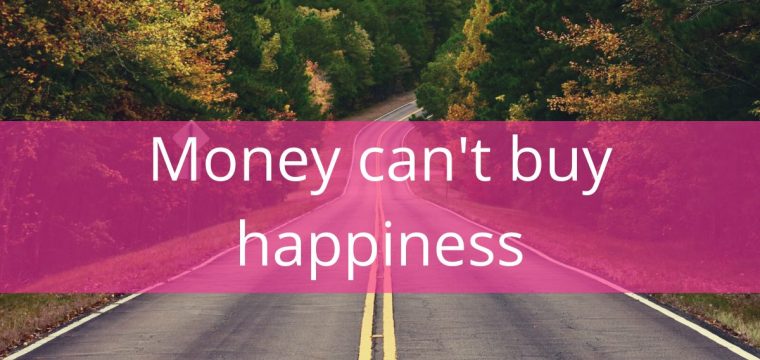Or can it? The saying ‘money can’t buy happiness’ isn’t always true…
If you live below the poverty line money will ensure you can buy yourself physical security and feel emotionally better due to the reduced stress that lack of money brings with it.
Disposable income can also be used to help others. Research suggests people who help others are happier than people who spent all of their money on themselves. Spare income allows us to donate to causes close to our hearts and leads to happiness.
Once we pass a certain threshold, namely $75,000US according to Economists Daniel Kahneman and Angus Deaton, we won’t be any happier when we earn more and upgrade existing and add more possessions to our own private empire.
The things that bring long-term satisfaction and contentment can’t be bought with money, on the contrary, instant gratification particularly can actually have the opposite effect.
Retail therapy
Plenty of people have the latest nice clothes, drive nice cars and own everything they aspire to but still aren’t happy. In fact, many people use shopping as an escape when they’re unhappy, so much so that there is a term for it: retail therapy.
Shopping gives us a short term kick but ultimately, it doesn’t work, it doesn’t give our lives meaning.
More money = less happiness
The more stuff we own, the more we can afford, the unhappier we often get. Why? Unless we inherit money, are born into wealth or win the lottery, we have to work for our money. In which case it means that more money equals more work, more stress and less time for the things we wanted to do once we have fulfilled all our wishes.
Buying a bigger house in a better suburb and a matching car equals a bigger mortgage and leads to more pressure and stress.
Having more possessions means higher maintenance costs including insurances, cleaning, security and other associated costs. Again, this adds to our workload and stress levels.
We work more to accumulate more and spend less time doing what we really like – hanging out with family and friends, going for a bush walk or simply doing nothing. Our overall day-to-day satisfaction with our lives declines.
Getting off the hamster wheel
What we often fail to realise is that the illusion of happiness and having it all is simply that – an illusion.
Keeping up with the Joneses doesn’t lead to satisfaction once we get there. Unfortunately, we realise that only once we get there and are waiting for the sense of happiness to set in and it doesn’t come. And so it goes on and on … buying your dream home is very different from living your dream life within it.
US President Jimmy Carter:
“In a nation that was proud of hard work, strong families, close-knit communities, and our faith in God, too many of us now tend to worship self-indulgence and consumption. Human identity is no longer defined by what one does, but by what one owns. But we’ve discovered that owning things and consuming things does not satisfy our longing for meaning. We’ve learned that piling up material goods cannot fill the emptiness of lives which have no confidence or purpose,”
Vote with your money
What we do with our money can have a big impact on the rest of the world. We can choose our suppliers on the basis of their track record, we can select products on the basis of quality and environmental impact. How and what we spend money on is a practical way of influencing supply and demand and if we spend our money in line with our values, we can make a difference in the world and give our spending and life meaning.
There are many new movements evolving aiming to help us find that meaning and purpose in life and overcome self serving indulgence and needless consumption.
For example the The New Joneses, Buy Nothing New, The Great Transition, to name just a few. This is not a call to spend, it’s a call to think about your spending and use the opportunity to create the new normal.
“The Happiness Fantasy”
And last but not least, what is happiness anyway? It is something most of us want but is a pretty abstract idea. Happiness is currently often interpreted as the idea that we should enjoy ourselves as much as possible.
“We are not only free to have fun, it’s practically mandatory.” Says Carl Cederstrom, a swedish professor at the Stockholm Business School has published “The Happiness Fantasy”. It turns out, there is a lot of pressure on us to be happy evidenced by social media accounts full of photos or videos of self-indulgent activities demonstrating our pursuit of happiness.
Instead, happiness should be about the things we share.
“… We’ve been programmed to to continually ask ourselves how we feel, whether we are happy enough and what we need to do to feel better. As a result we often start to feel worse. Instead, we should think about the values that we care about and try to put them first in our lives instead of this idea that we should be happy.”
And what does this have to do with the question of whether money can’t or can buy happiness. Well it goes to the core of the question and supports the idea that money can’t buy happiness because the current idea of happiness is an unattainable illusion and we are better off to focus on the meaning and purpose of life.
Links for further reading:



